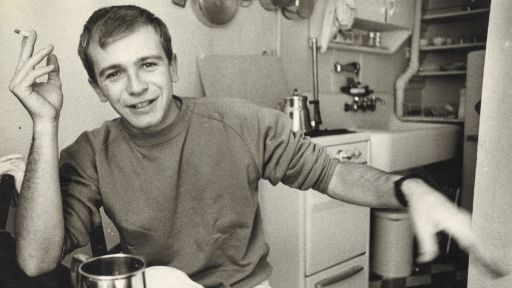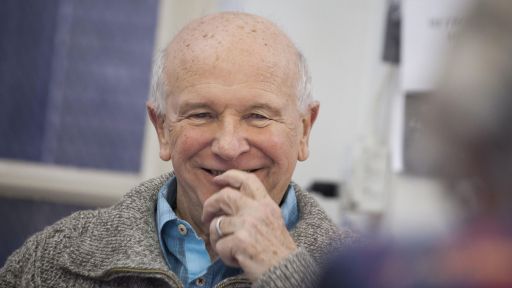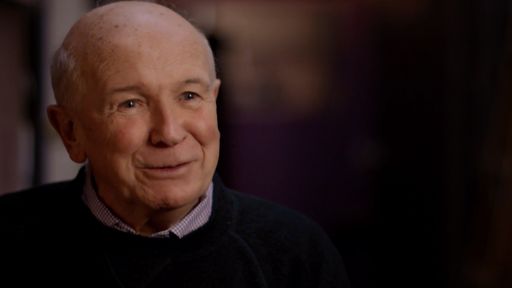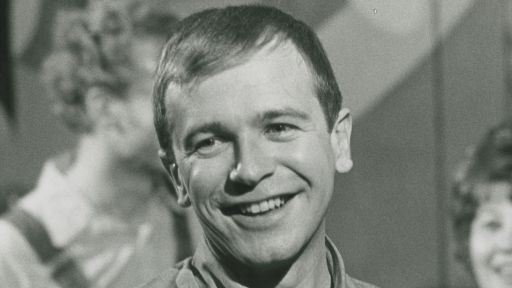1938: Michael Terrence McNally is born Nov. 3 in St. Petersburg, FL, to Hubert and Dorothy (née Rapp) McNally, transplanted New Yorkers who run a seaside bar and grill. His only sibling, Peter, is born six years later.
1946-9: After the family bar and grill is destroyed in a hurricane, the McNallys return to Dorothy’s hometown of Port Chester, NY. The family later moves to Dallas, TX. While McNally is in fifth grade, an Ursuline nun at Christ the King School introduces him to opera. He spends Saturday afternoons listening to Live from the Met on the radio and attends his first two Broadway shows (Annie Get Your Gun, starring Ethel Merman, and The King and I, starring Gertrude Lawrence), which make a lasting impression.
1949-56: The family relocates a final time to Corpus Christi, TX. During his years at W. B. Ray High School (1952-56), McNally is mentored by Maurine McElroy, an extraordinary English teacher who regularly invites select students to her home to read poetry and listen to classical music.
1956-60: After being encouraged by Mrs. McElroy to attend college out of state, McNally wins a scholarship to attend Columbia College as a journalism major, returning to Corpus Christi summers to work as a cub reporter for the Times Caller. In New York City McNally begins a lifelong practice of attending the theater and opera several nights a week. After meeting twenty-nine-year-old Edward Albee, the nineteen-year-old McNally moves in with the budding playwright. They will remain a couple for about five years.
1961-62: While working as a stage manager at the Playwrights Unit of the Actors Studio, McNally is recruited by director Molly Kazan to travel with and tutor the two teenaged sons of Nobel Prize-winning novelist John Steinbeck and his third wife, Elaine, as the family embarks on what is expected to be a year-long cruise around the world.
Following their return to New York, Steinbeck suggests that McNally write the book for Here’s Where I Belong, an ill-fated musical adaptation of Steinbeck’s East of Eden.
1964-65: Early versions titled Bump and There Is Something Out There are workshopped by Albee-Barr Wilder in New York and by the Guthrie Theater in Minneapolis before And Things That Go Bump in the Night opens on Broadway April 26, 1965.
Dismayed to see an unapologetically gay character on the Broadway stage rather than relegated to Off-Off-Broadway where they thought he belonged, critics vehemently disparage the play. But committed producers keep it running for two weeks, allowing McNally to learn from his actors and from the audience’s response what was and was not working.
During the play’s development process McNally separates from Albee and becomes lovers with Bobby Drivas, the actor playing Sigfrid. McNally writes his next several plays for Drivas, tailoring Where Has Tommy Flowers Gone? (1971) to showcase Drivas’s talents. Drivas will go on to direct McNally’s The Ritz and Bad Habits, as well as star in Albee’s The Man With Three Arms (1983), and will remain one of McNally’s closest friends until Drivas’s death from AIDS-related causes in 1986.
1969: Next, written for good friend, actor James Coco, becomes McNally’s first critical and financial success. It is directed by Elaine May, whom McNally credits with giving him a crash course in play-writing.
1975: The Ritz premieres Jan. 20 at the Longacre Theatre in New York City, and runs for 400 performances. Richard Lester’s 1976 film version retains the original cast but fails to capture the manic high spirits of the stage production.
1978: Broadway, Broadway, McNally’s attempt to tum to comic fodder the failure of And Things That Go Bump thirteen years earlier, fails during its try out in Philadelphia, preempting its scheduled opening in New York. In 1985, McNally will rewrite the play as the wildly successful It’s Only a Play.
1978-84: McNally commutes between New York and Hollywood as he collaborates with television producer Norman Lear on “The Education of Young Harry Bellair, Esq.,” a situation comedy set in early eighteenth century London that draws upon the conventions of Restoration comedies of manners. Although “Education” and several other pilots fail to find network support, McNally’s adaptation of John Cheever’s “The Five-Forty-Eight” for PBS (1979) earns critical acclaim, and his Mama Malone runs on CBS in summer 1984.
1985-95: Following the successful run ofIt’s Only a Play, McNally embarks on a decade-long collaboration with the Manhattan Theatre Club (MTC). MTC will premiere a string of McNally hits—Frankie and Johnny in the Clair de Lune (1987), The Lisbon Traviata (1989), Lips Together, Teeth Apart (1991), A Perfect Ganesh (1993), and Love! Valor! Compassion! (1994)—making for one of the most successful pairings of playwright and theater company in twentieth-century American theater history.
The emerging AIDS epidemic infuses McNally’s work with an extraordinary poignancy. The loss of Bobby Drivas in 1986 to AIDS, followed a year later by the fatal coronary of a close friend and collaborator James Coco, prove the immediate impetus for McNally’s extended meditation on the nature of, and impediments to, human connection that extends across several plays. At the same time, a trip to India following Coco’s memorial service introduces McNally to a religious view of life that sanctifies loss as an essential part of humanity, allowing him to create the lyrically transcendent endings that characterize the plays of his MTC period. (In 1982, McNally had stopped drinking, which likewise altered the tone of his plays, which come to demonstrate a warmer and more compassionate acceptance of human weaknesses.)
1985-2001: As Vice President of the Dramatists Guild, McNally is active in theater community events to raise awareness of the toll that AIDS is taking on the arts community, and in protests to save three beaux-arts theater buildings threatened with demolition to make way for Times Square’s Marriot Marquis Hotel and Theater. Both concerns extend to his creative work as well, which become meditations on the nature of loss and artistic depletion. Thus, in plays like Some Christmas Letters, The Last Mile, the Tony Award-winning Love! Valour! Compassion! and the Emmy Award-winning Andre’s Mother, McNally becomes a major voice during the AIDS epidemic. And in Ghost Light and Dedication, he examines America’s failure to preserve its theater heritage.
1993: McNally wins the first of his four Tony Awards for his book for the musical Kiss of the Spider Woman. Subsequent Tony Awards will be for Love! Valour! Compassion! (1995), Master Class (1996) and the book for the musical Ragtime (1998). Earlier McNally had won the Hull-Warriner Award—notable because it is bestowed by dramatists upon their fellow dramatists—in 1974 for Bad Habits, in 1987 for Frankie and Johnny in the Claire de Lune and in 1989 for The Lisbon Traviata. In addition, he has won four Drama Desk Awards, two Lucille Lortel Awards, and two Obie Awards.
1996: Inducted into the American Theater Hall of Fame.
1998: Awarded an honorary degree by The Juilliard School for “invaluable contribution to the theater.”
1998-99: Controversy over McNally’s retelling in Corpus Christi the story of Jesus’s life and ministry in terms of a gay teenager’s coming of age in 1950s Texas is fanned by a New York Post columnist and by protests organized by the Catholic League for Religious and Civil Rights. McNally responds to the controversy surrounding Corpus Christi in his book for the musical A Man of No Importance (2002), which concerns a conservative church community’s censoring an amateur theater group’s production of Oscar Wilde’s Salome, and in Crucifixion (2005), which addresses the sexual hypocrisy of the Roman Catholic Church. (Crucifixion is honored as Best New Script by the San Francisco Critics Association.)
McNally’s relationship’s with MTC is strained after the theater rejects Dedication or The Stuff of Dreams, which had been commissioned to inaugurate its recently refurbished Broadway theater, the Samuel Friedman (formerly the Biltmore). A reconciliation occurs in 2011 when MTC moves the Kennedy Center production of McNally’s Master Class, starring Tyne Daly, to Broadway. But MTC’ s production of Golden Age in 2012 proves disappointing, resulting in a second hiatus in the playwright and theater company’s working relationship.
2000: Dead Man Walking, based on the 1993 memoir of the same title by Sister Helen Prejean, with music by Jake Heggie, premieres at the San Francisco Opera and becomes the most frequently produced English language opera across the globe. In 2015 McNally will contribute the libretto to a contemporary comic opera scored by Heggie, Great Scott.
2001: The first manifestation of cancer results in the removal of a portion of one lung in December. Although McNally had stopped smoking in 1981, a recurrence results in the removal of a portion of his second lung in 2007.
2003: After living together since 2001, McNally and social activist lawyer Tom Kirdahy enter into a civil union in Dover, VT, on December 20. After the District of Columbia declares gay marriage legal, the couple is married in Washington on April 6, 2010, with actors Tyne Daly, John Glover and Malcolm Gets, as well as Kennedy Center president Michael Kaiser, as their witnesses. And after the U. S. Supreme Court makes gay marriage legal across America, they repeat their vows on the steps of New York’s City Hall in a ceremony conducted by Mayor Bill de Blasio on June 26, 2015. Beginning in 2007, Kirdahy becomes increasingly active in producing McNally’s plays.
McNally had previously registered a domestic partnership with Gary Bonasorte, a founding member of the Rattlestick Theater Company, with whom he lived from 1993 until Bonasorte’s death from AIDS-related causes in 2001. A self-described “serial monogamist,” McNally had one additional long-term relationship, with actor Dominic Cuskern. Although biographer Julie Salamon records that McNally had an affair with playwright Wendy Wasserstein (1987-90), McNally identifies as gay.
2008: On McNally’s seventieth birthday, legendary Broadway theater restaurant Sardi’s unveils its caricature of the playwright.
2010: The John F. Kennedy Center for the Performing Arts honors McNally by staging his three plays about opera (The Lisbon Traviata, Master Class, and Golden Age) simultaneously on its three stages.
2011: Receives the Dramatists Guild Lifetime Achievement Award.
2013: Returns to his alma mater, Columbia University, to address the graduating class on their Class Day. McNally’s speech movingly reviews the changes in American gay life and social consciousness since his own graduation in 1960.
2015: To honor the fiftieth anniversary of McNally’s Broadway debut, Grove Press collects eight of McNally’s plays under the title Selected Works: A Memoir in Plays. McNally contributes an introductory essay to each play in which he recalls the circumstances of its composition, the conditions of American theater at the time, and his personal engagement with the play’s issues. McNally receives the Lucille Lortel Lifetime Achievement Award from the League of Off-Broadway Theatres and Producers.
2018: McNally is inducted into the American Academy of Arts and Letters as one of only five playwrights included in this body. A documentary of his life and career titled Every Act of Life (dir. Jeff Kaufman) premieres at the Tribeca Film Festival.
In honor of McNally’s eightieth birthday, New York City Mayor de Blasio declares November 4 “Terrence McNally Day.” The official proclamation praises McNally for having served “as a civil rights activist, championing marriage equality and tackling issues that impact the LGBTQ community and people with HIV/AIDS,” and concludes: “Through his thought-provoking and witty plays, musicals, and operas, Terrence has engaged and uplifted generations of diverse audiences in New York and far beyond, and at age 80, the untiring artist is still creating new works.”
2020: McNally dies in Sarasota, Florida of complications from the coronavirus.






